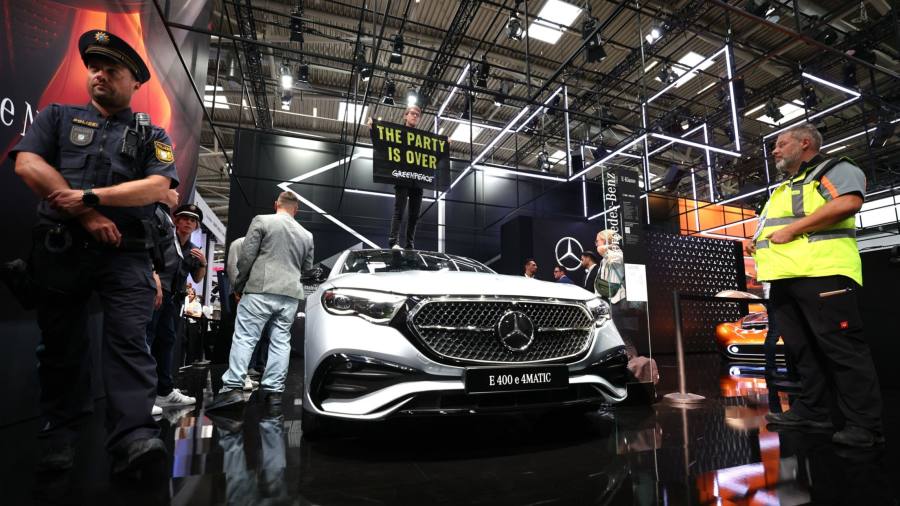
Receive free Automobiles updates
We’ll send you a myFT Daily Digest email rounding up the latest Automobiles news every morning.
So-called e-fuels are set to play a key role in the future of the European automotive industry, according to several of the region’s carmakers, as they believe a concession from Brussels over the alternative fuels will allow them to keep selling combustion-engine vehicles into the next decade.
Under pressure from Germany and Italy, the European Commission this year said cars that run on fuels made using carbon captured from the atmosphere could be exempt from a planned ban on sales of combustion-engine cars from 2035.
Speaking on the sidelines of the biennial Munich motor show, executives from BMW, Renault and Mercedes-Benz said e-fuels, which are not yet commercially viable, were a pragmatic solution in their quest to cut emissions.
Mercedes-Benz previously announced an “ambition” to stop selling combustion engines where market conditions allow by the end of this decade.
Nevertheless, the Stuttgart-based company’s chief executive Ola Källenius told the Financial Times it was not putting “a final stop date” to combustion engines. The company was “ready” to sell fully electric cars when required by customers but wanted to maintain “tactical flexibility” right up until its target to become fully carbon neutral by 2039.
“This is a journey of many years and our production plans are flexible, so we can flex between electric and combustion,” he said.
Many industry executives have argued that less polluting fuels will be essential to reduce emissions from old cars in the future, but critics fear they will delay EU plans to phase out the combustion engine by 2035. The electric vehicle campaign group Transport & Environment has called the exemption on e-fuels a “Trojan horse” for fossil fuels.
Electric vehicle makers at the motor show were also critical of the companies supporting concessions for e-fuel-powered cars.
“A year ago we were beyond this and now we are back in that silly discussion about if electric mobility is really important,” said Thomas Ingenlath, chief executive of EV brand Polestar. “The longer you discuss it, the more you will lose the chance to actually be still relevant in the future.”
However, BMW’s chief executive Oliver Zipse said Berlin would “never have agreed” to EU plans to completely phase out petrol and diesel cars without the inclusion of an exemption for e-fuels.
He also questioned whether the EU would end up banning sales of new combustion-engine cars by 2035, pointing to its plans to review progress with challenges such as rolling out EU-wide charging infrastructure and securing raw battery materials in 2026. “You wouldn’t do a review if legislators were certain that everything was in order,” Zipse said.
Renault’s technology chief Gilles Le Borgne said the concession on e-fuels could “open the door” for longer use in the French carmaker’s hybrid models in future and urged regulators to remain “technology neutral” when setting the rules.
“We need to be open-minded on technology, we must not [have the technology] imposed,” he told the FT. “That would be a disaster.”
He added that e-fuels should be used in older vehicles to help lower their emissions. “This is the only way to fix the current fleet,” said Le Borgne. “If you don’t have any e-fuels, you will never fix the current fleet.”
The technology behind alternative fuels such as e-methane or e-kerosene, which are made with captured CO₂ and hydrogen produced from renewable or low-carbon electricity, is still in its early stages.